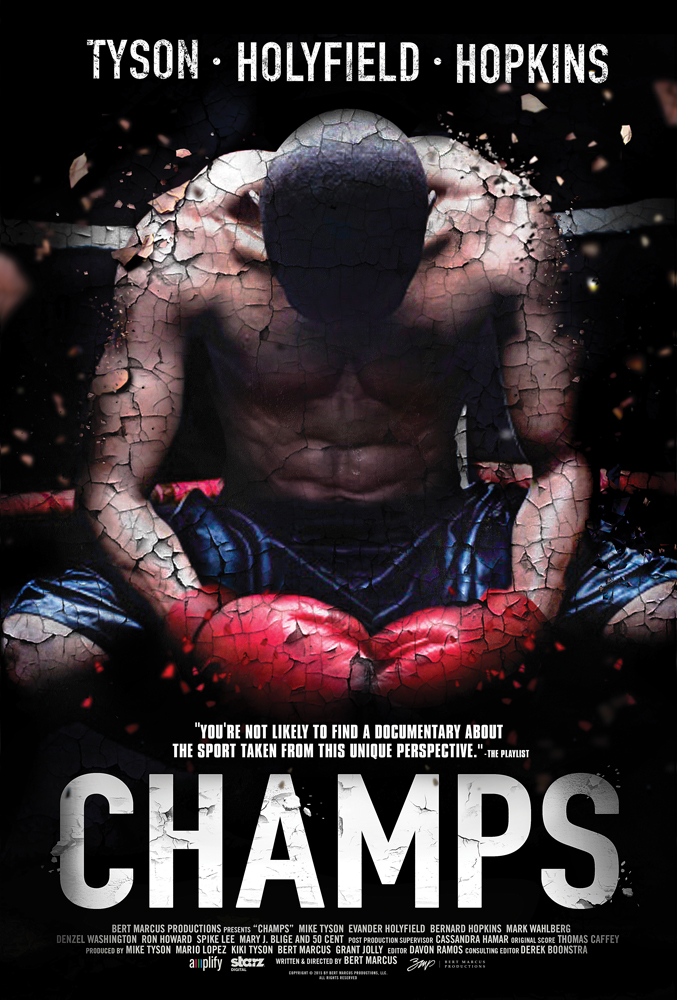Filmmaker Bert Marcus Talks Boxing Documentary “CHAMPS”
03.11.2015
SPORTS
In the 20th century boxing icons such as Jack Dempsey, Joe Louis, Muhammad Ali, Roberto Duran, Sugar Ray Leonard, and Mike Tyson had dominant reigns and were internationally recognized athletes. Over the years, the sport has waned in national popularity but as demonstrated by producer/writer/director Bert Marcus in his new documentary CHAMPS, the sweet science makes for a compelling lens through which to examine class and society.
“The goal was that collectively through introspection and the knowledge that built the film,” said Marcus, “we as an audience and society can really overcome some of those circumstances in our own lives, and figure out what it is to be a champion in life, not just a champion in sports and the ring. We wanted to open up this conversation to a much broader audience and bring some of these issues to the forefront, especially for a sport that has had such a rich history that is so dangerous with no governing body. And the irony is that the sport that ends up saving their lives, also ends up ruining their lives.”
Focusing on Mike Tyson, Evander Holyfield and Bernard Hopkins, CHAMPS follows each fighter from their rough childhoods, to their reigns as champions, through their lives after the limelight. Life+Times spoke with Marcus about CHAMPS and the role boxing plays in society.

Life+Times: There have been many boxing documentaries and there are several different ways to look at the sport of boxing. Why did you pick this particular perspective?
Bert Marcus: I feel like the film was really inspired by my passion to showcase the irony that’s really inherent in the sport of boxing. As you mentioned, boxing has been well-documented and was once considered the pinnacle of American athleticism and entertainment, and has played an instrumental role in the history of this country on so many levels. The idea, to me, of men and women choosing to take part in this sport which happens to be the most savage and dangerous profession with the most risk to escape violence that they would otherwise face in the streets is the ultimate paradox. Following some of these guys’ careers, I felt like this was a really interesting way to open up not just the sport, but some of the biggest issues going on in the world, to a much broader audience. That was the goal. We wanted to make something boxing fans will love and respect, but the goal too was also to open up a much larger, more important conversation because this is really a microcosm of much bigger issues going on in the world. I think through Mike Tyson, Evander Holyfield and Bernard Hopkins, we really examine the struggles through some of the most unimaginable obstacles, everything from economic insecurity, broken homes, inaccessible education, physical and sexual abuse, crime, prison, financial ruin, depression. Through these points, we’re hoping audience members can reflect, take a step back and learn.
L+T: Why did you focus on these three fighters? Did you know they would have so much in common?
BM: I definitely did not know they would have [so many similarities]. Mike [Tyson] was one of the most important parts of putting this film together. He was an active producer on the film, and he and his wife Titi provided great insight and were phenomenal. I didn’t know we were going to go with [those boxers], in particular, but the goal was to find people who would be vulnerable, open up and really want to share who they really are and parts of their lives and careers that haven’t been told before. I found that these guys were really relatable and guys that people a lot of people can connect with. They happened to come from the same generation, are pretty much the same age and what I found so interesting is they have such different personalities. They’re such different guys, yet their lives and careers all intersect at some point.
L+T: It’s been said that if you want to know who the lowest class of people are, look at who are the champions in boxing.
BM: Spike Lee said that [in the film]. That’s a perfect example. We didn’t just make the film for boxing fans, but made it a broader film that a lot of people can relate to and connect with.
L+T: You interviewed several other people outside of the boxing profession, including professors, Mary J. Blige, Denzel Washington.
BM: I think that was a really important part of the film, to not just have boxing insiders and professionals. The real goal of the film was to show how the sport is so universal and can be used as a vehicle to connect with people around the world who may not be sports fans. We had actors – Mark Wahlberg, Denzel, Ron Howard – who were all part of very successful boxing films in the past. Mark was in The Fighter and nominated for an Academy Award; Denzel was in The Hurricane, is really connected with boxing – not just as an avid fan, but he boxes regularly; Ron Howard starred in the acclaimed boxing film Cinderella Man. Then there were people like 50 Cent, who is now a professional boxing promoter, and has a really inspiring story himself that is very similar to a lot of these boxers. He was actually an amateur boxer himself. Spike Lee is very close with Mike [Tyson] and has been a huge sports fan and made some poignant comments in the film that really helped tell the story. Mary J. Blige has such an interesting story that a lot of people know about, but many people don’t know her enthusiasm for the sport and the respect she has for these guys. She can relate to them on a very different level with the things she’s been through in her own life. That’s why we wanted people in there like that who you wouldn’t expect to be so impacted by these guys and the sport. We had other people like famous promoters and analysts, then we have guys like Dalton Conley, a professor at NYU and John Pfaff, an associate professor of law at Fordham University.
L+T: At the end of the film, you focus on concussions and brain damage, which is very similar to the conversation currently surrounding football. Talk about discussing that aspect. You hit on what leads people to boxing, what goes on during their careers, and then what happens when it’s all over.
BM: It’s something that’s a major problem. How can you have guys escaping violence with violence, but there’s nothing in place to help them with their lives or their well-being? There’s no governing body or programs put in place to look out for what these guys are going through. We’re talking about human beings with families and possibilities for a great life. So, that’s something that’s really concerning. Also, you have the top one percent of fighters in the world – you can tell that with the Floyd Mayweather-Manny Pacquiao fight coming up – making 99 percent of the money. So, what happens to the average independent fighter? The average salary is roughly $30,000 per year. The minimum salaries in other sports are significantly higher, you can’t even compare them to boxing. Boxing has done very little to help the safety of its fighters. Even the NFL– which has a lot of work to do – in 2013 reached settlements with former players who suffered from brain injuries. Boxing is regulated at the federal level on a very minimal basis and that’s a major problem. You have things that have been put in place that have not been used to help anybody. 99 percent of boxers suffer some type of major brain injury during their career; only a single MRI is given to a boxer to get his license to fight. No follow-ups are ever required.
CHAMPS will be in theaters, on demand and on iTunes March 13th.





